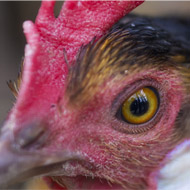
Method provides alternative way of studying cell-virus interactions
A new laboratory technique that reduces the need for experimental chickens has been developed by scientists from The Pirbright Institute.
The method, described in the journal JoVE, allows scientists to isolate chicken immune cells infected by infectious burial disease virus (IBDV), known as B cells, and grow them in a laboratory. This enables the interaction between B cells and the virus to be investigated, helping scientists to better understand the disease and develop effective treatment strategies.
“We hope that our procedure can be used and adapted by many other scientists who work with chicken B cells, so that as a community we can reduce the number of birds needed for our experiments,” said Dr Andrew Broadbent, Institute Fellow who heads the Birnaviruses group at Pirbright.
IBDV is a highly contagious disease of poultry that can lead to immunosuppression and mortality in infected birds. Until now, studying how IBDV interacts with the cells it infects was difficult to achieve in the laboratory, as B cells would not survive when removed from chickens.
Researchers say the new method will provide an alternative way of studying cell-virus interactions and could reduce the number of chickens needed for this research by around 5,000 each year.
Dr Broadbent added: “Our research opens up the possibility of studying other viral interactions, such as understanding why some IBDV strains are more virulent, the reaction of B cells to infection with multiple viruses and testing the ability of vaccines to produce immune responses.”
Researchers say the new technique could also be used to study other poultry diseases that infect B cells, such as avian leukosis virus, and could be applied to other hosts like ducks or turkeys.



 RCVS Knowledge has welcomed Professor Peter Cockcroft as editor-in-chief for Veterinary Evidence.
RCVS Knowledge has welcomed Professor Peter Cockcroft as editor-in-chief for Veterinary Evidence.